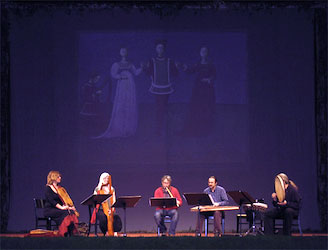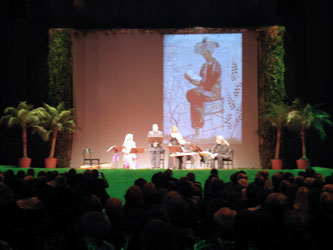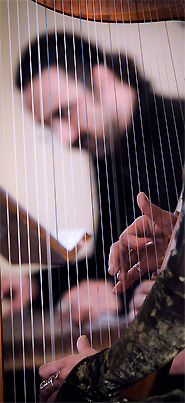Hortus Conclusus -
The Closed Gardens of Paradise

The universal mysticism of love
in medieval
Christian and Muslim songs
The closed garden, the immured place of bliss,
is a theme
that permeates both Oriental and European
cultural history.
The word «paradise» goes back to the Old Iranian
«pairidaeza», which means «immured place».
Also in Persia, a special tradition of garden architecture
was developed, characterized by gardens
in the middle of a building,
always with a well
symbolizing life in their center.
All three religions of the book – Judaism, Christianity, Islam – unanimously share the notion of the place where blessed
people go
after they have died as a garden: Gan-Eden ('Garden of Eden') Paradise, and Jannah ('Garden'). Therefore the
image of awalled garden has always been present in mystical thinking.
The four gardens of paradise – garden of the soul,
garden of the heart, garden of the spirit and garden of the essence –
represent the journey of the soul in Islamic mysticism.
In Christianity, the verse from the Song of Songs, «A garden enclosed is my sister, my spouse; a spring shut up, a fountain
sealed»,
was correlated with the Virgin Mary. Paintings such as Martin Schongauer's «Madonna in the Rose Bower» as well
as many song texts prove the powerful effect of this mystical, erotic image, as the Hortus Conclusus theme can be found
both
in the liturgy of the Marian feast days and in worldly compositions.
Especially the Persian and Ottoman culture reveals how much poets and composers were concerned with the garden theme,
jointly celebrating mystical and erotic union. The garden in bloom as a symbol for the promise of bliss,
as a place of rendezvous
and as the dwelling of the lamenting nightingale is the topic of many vocal compositions
and appears as a programmatic title
for instrumental pieces. Images of mystic gardens adorn countless
Persian and Ottoman manuscripts.
European and Persian-Ottoman music about gardens closed, mysterious and freshly in bloom,
accompanied by projections
of illustrations from the medieval Orient and Occident,
tell how in the closed garden of paradise the 'spiritual' and 'worldly'
spheres unite in a universal mysticism of love.
Reviews
«On the eroticism of faith. Vladimir Ivanoff and his Ensemble Sarband enchanted with treasures
of the medieval Orient and
Occident at the Graz Easter festival.
Vladimir Ivanoff is a sophisticated cartographer of the exceptional. Delightful array of
voices …
The projected texts, displayed onto images of Gregorian notation, miniatures from the Bible or Oriental carpets,
were a work of art in their own right. In a nutshell: seamless enjoyment.»
Michael Tschida, Kleine Zeitung (Austria), 31.03.2010



